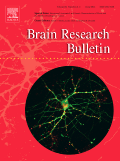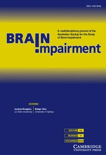
BEHAVIOURAL NEUROLOGY
Scope & Guideline
Unlocking Potential: Researching the Neurological Foundations of Behavior
Introduction
Aims and Scopes
- Neurodegenerative Diseases:
Research on conditions such as Alzheimer's disease, Parkinson's disease, and amyotrophic lateral sclerosis, focusing on behavioral symptoms, cognitive decline, and potential therapeutic strategies. - Pain and Psychological Conditions:
Investigations into the relationship between chronic pain conditions and psychological factors such as depression, anxiety, and stress, aiming to identify effective management and treatment approaches. - Cognitive Assessment and Rehabilitation:
Studies aimed at assessing cognitive functions in various populations, including those with brain injuries or neurodegenerative diseases, and developing rehabilitation techniques to enhance cognitive recovery. - Neuroinflammation and Neuroprotection:
Research into the role of neuroinflammation in neurological disorders, examining potential neuroprotective agents and their mechanisms of action. - Innovative Methodologies in Neuroscience:
Utilization of advanced technologies such as neuroimaging, optogenetics, and artificial intelligence in understanding brain function and behavior. - Psychosocial Factors in Neurological Disorders:
Exploration of how social support, personality traits, and environmental factors influence the experiences and outcomes in patients with neurological conditions.
Trending and Emerging
- Impact of COVID-19 on Neurological Health:
Increased focus on the psychological and neurological impacts of the COVID-19 pandemic, including studies on burnout, mental health, and cognitive impairments related to the virus. - Multimodal Approaches to Treatment:
Growing interest in interventions that combine various treatment modalities, such as acupuncture, cognitive-behavioral therapy, and pharmacological treatments, to address complex neurological issues. - Neuroinformatics and AI Applications:
The rise of artificial intelligence and machine learning in analyzing neurological data, improving diagnosis, and personalizing treatment plans is becoming a significant area of interest. - Exploration of Gut-Brain Axis:
Emerging research on the gut-brain connection, particularly how gut microbiota influences neurological health and behavior, is gaining traction and relevance. - Behavioral Interventions for Pediatric Populations:
A noticeable increase in studies focusing on behavioral therapies and interventions aimed at children with neurological disorders, particularly ADHD and autism spectrum disorders.
Declining or Waning
- Traditional Pharmacological Treatments:
Research that primarily focuses on traditional pharmacological approaches for managing neurological disorders appears to be waning, as there is a growing emphasis on holistic and integrative treatment methods. - Single-Disease Focus Studies:
The journal has seen a decline in studies that focus solely on individual diseases without considering comorbidities or overlapping psychological factors, reflecting a broader interest in multifaceted approaches to treatment. - Basic Animal Models:
While animal studies remain important, there is a noticeable reduction in basic animal model research that does not translate into human applications, as more emphasis is placed on translational research that connects basic science with clinical outcomes. - Generalized Neuropsychological Testing:
The prevalence of studies using generalized neuropsychological assessments without specific contextual relevance is decreasing, as there is a shift towards more targeted and condition-specific evaluations.
Similar Journals

BEHAVIOURAL BRAIN RESEARCH
Illuminating the Interplay Between Mind and BrainBEHAVIOURAL BRAIN RESEARCH, published by Elsevier, is a leading scholarly journal that has been at the forefront of research in Behavioral Neuroscience since its inception in 1980. With an ISSN of 0166-4328 and an e-ISSN of 1872-7549, this journal caters to a global audience of researchers and professionals keen on exploring the intricate relationships between behavior and neural processes. As of 2023, it holds an impressive Q2 ranking within its category, showcasing its significant impact with a Scopus rank of #28 out of 88 in the field, placing it in the 68th percentile. While the journal does not offer open access, it remains accessible through institutional subscriptions, ensuring that its high-quality research is disseminated effectively. The journal's commitment to advancing knowledge in behavioral neuroscience makes it an indispensable resource for those looking to delve deep into the complexities of brain-behavior interactions and foster innovative approaches in both research and clinical applications.

BRAIN RESEARCH BULLETIN
Unveiling the mysteries of the brain, one study at a time.BRAIN RESEARCH BULLETIN is a leading academic journal published by PERGAMON-ELSEVIER SCIENCE LTD, dedicated to the dissemination of high-quality research in the interdisciplinary field of neuroscience. Since its inception in 1976, this journal has served as a vital platform for researchers, professionals, and students interested in a broad spectrum of topics within neuroscience, making significant contributions to the understanding of brain function and its associated disorders. With a commendable impact factor and a current Scopus rank of #35 out of 113 in general neuroscience, the journal holds a Q2 quartile ranking, underscoring its relevance and influence in the academic community. BRAIN RESEARCH BULLETIN invites submissions of original articles, reviews, and brief communications, enhancing scholarly communication within this dynamic field. Although the journal is not open access, it ensures widespread reach and impact through various subscription models, allowing access to pivotal findings that pave the way for future research advancements. For researchers aiming to share impactful discoveries and insights within the neuroscience community, BRAIN RESEARCH BULLETIN remains an essential outlet.

Journal of Pediatric Neuropsychology
Bridging research and clinical practice for young minds.Journal of Pediatric Neuropsychology is a pioneering academic journal dedicated to advancing the field of pediatric neuropsychology. Published by SpringerNature, this journal serves as a vital platform for researchers, clinicians, and students aiming to explore the complexities of neuropsychological development in children. With ISSN 2199-2681 and E-ISSN 2199-2673, the journal focuses on a broad spectrum of topics including cognitive processes, neurological disorders, and the impact of neuropsychology on educational and therapeutic practices. Though currently not listed as an Open Access journal, it aims to disseminate knowledge that influences clinical practices and supports interdisciplinary collaboration. The Journal of Pediatric Neuropsychology stands out for its commitment to enhancing understanding within this specialized field, making it an essential resource for professionals and researchers dedicated to improving outcomes for children with neuropsychological challenges.

AIMS Neuroscience
Unlocking the mysteries of the brain, one study at a time.AIMS Neuroscience is an esteemed open-access journal published by the American Institute of Mathematical Sciences (AIMS), dedicated to advancing the field of neuroscience since its inception in 2014. With a robust ISSN of 2373-8006 and an E-ISSN of 2373-7972, this journal aims to provide a platform for innovative research and scholarly discourse that spans the diverse and dynamic landscape of the neuroscience discipline. As of 2023, it holds a respectable Q3 category ranking in the miscellaneous neuroscience field and ranks #65 out of 113 in general neuroscience according to Scopus, positioning it in the 42nd percentile for impact. AIMS Neuroscience encompasses a broad scope of topics, from neurobiology and cognitive neuroscience to computational models and neuroengineering, making it a vital resource for researchers, professionals, and students alike. The journal's commitment to open access ensures that cutting-edge research is freely available, fostering collaboration and knowledge sharing within the global neuroscience community.

NEUROLOGIA
Transforming Neurological Care with Cutting-Edge ResearchNEUROLOGIA, an esteemed journal published by ELSEVIER ESPANA SLU, stands at the forefront of the field of neurology, with a dedicated focus on innovative research and clinical practice since its inception in 1973. As an Open Access journal since 2017, it champions the dissemination of knowledge, allowing researchers, professionals, and students alike to access cutting-edge findings in neurology without barriers. With an impressive Scopus rank of #115 in the clinical neurology category, placing it in the 71st percentile, NEUROLOGIA is categorized as Q3 in both general medicine and clinical neurology, reflecting its impact and relevance in a rapidly evolving field. Based in Barcelona, Spain, the journal's commitment to advancing understanding of neurological conditions is underscored by its rigorous peer-review process and engagement with a global audience. As it continues to publish vital research that shapes clinical practices and informs policy, NEUROLOGIA remains an integral resource for those striving to improve outcomes in neurology.

Cognitive and Behavioral Neurology
Advancing the Frontiers of Cognitive and Behavioral NeurologyCognitive and Behavioral Neurology is a prominent peer-reviewed journal dedicated to advancing the understanding of cognitive and behavioral aspects of neurological disorders. Published by Lippincott Williams & Wilkins, this journal has established itself as a vital resource for researchers, clinicians, and students in the fields of cognitive neuroscience, neuropsychology, and psychiatry. With an ISSN of 1543-3633 and an E-ISSN of 1543-3641, it offers a robust platform for the dissemination of high-quality research, as evidenced by its positioning in the Q3 quartiles across various categories, including Cognitive Neuroscience and Psychiatry. The journal, which has been actively publishing since 2003, encourages innovative studies that explore the intersection of cognition and behavior in neurological contexts. As a vital contributor to the academic dialogue on these topics, it provides an essential archive of findings and discussions that inform clinical practice and educational approaches, reflecting its commitment to improving patient outcomes and enhancing neurological science.

Zeitschrift fur Neuropsychologie
Illuminating Cognitive Processes for Better Mental HealthZeitschrift für Neuropsychologie, published by HOGREFE AG in Switzerland, stands as a vital resource for scholars and practitioners in the fields of neuropsychology, cognitive neuroscience, and psychiatry. With an ISSN of 1016-264X and E-ISSN 1664-2902, this journal aims to disseminate high-quality research that enhances understanding of cognitive processes and their implications for mental health. While currently classified in the fourth quartile across relevant categories, including Cognitive Neuroscience and Neuropsychology, it offers valuable insights that contribute to the emerging discourse in these areas. By publishing both empirical studies and theoretical papers, it encourages interdisciplinary dialogues among researchers and clinicians. Although the journal is not Open Access, its role in advancing neuropsychological research is significant, fostering academic linkages from its base in Bern, Switzerland. By continually focusing on the latest advancements and fostering innovative approaches within the field, Zeitschrift für Neuropsychologie remains a crucial platform for those committed to exploring the complexities of the human mind.

Applied Neuropsychology-Child
Fostering interdisciplinary dialogue for child development.Applied Neuropsychology-Child is a leading academic journal dedicated to advancing the field of developmental and educational psychology, as well as neuropsychology, with a particular focus on child development. Published by Routledge Journals, Taylor & Francis Ltd, this journal provides critical insights into the cognitive and behavioral aspects of children, fostering interdisciplinary dialogue among researchers, clinicians, and educators. With a commendable impact factor and a categorization of Q3 in both associated fields for 2023, the journal plays a pivotal role in shaping current practices and enhancing academic discourse. Access to Applied Neuropsychology-Child is available through subscription, ensuring that high-quality research is disseminated widely amongst scholars and professionals. Since its inception in 2012, this journal has consistently aimed to illuminate the challenges and developments in child neuropsychology, making it an essential resource for anyone invested in the psychological well-being and educational success of children.

Brain Impairment
Empowering researchers to shape the future of neuroscience.Brain Impairment, published by Cambridge University Press, is a pivotal academic journal dedicated to advancing the understanding of neurological conditions and cognitive processes. With its ISSN 1443-9646 and E-ISSN 1839-5252, this esteemed journal has been at the forefront of research in the fields of Behavioral Neuroscience, Cognitive Neuroscience, and Neuropsychology since its inception in 2004. Covering a broad scope, it addresses critical insights into brain function, impairments, and therapies, making it a valuable resource for researchers, clinicians, and students alike. Brain Impairment holds various rankings, including Q4 in Behavioral Neuroscience and Q2 in Speech and Hearing, reflecting its significance in the academic community. While the journal operates under print access, its rich content serves as an essential reference for professional development and scholarly discussion in the UK and beyond. Researchers and practitioners can rely on this journal to provide cutting-edge research and reviews that inform clinical practice and shape future studies in neurology and cognitive neuroscience.

ARCHIVES OF CLINICAL NEUROPSYCHOLOGY
Transforming Research into Clinical ExcellenceARCHIVES OF CLINICAL NEUROPSYCHOLOGY is a premier academic journal dedicated to the vital intersections of clinical psychology, neuropsychology, and psychiatry, offering researchers and clinicians a platform to publish cutting-edge findings and comprehensive reviews. Published by Oxford University Press, the journal aims to advance the understanding of the cognitive and psychological aspects of neurological conditions through rigorous empirical research and innovative methodologies. With an impressive range of quartile rankings, including Q2 in Clinical Psychology and Neuropsychology, the journal stands out for its commitment to enhancing clinical practices and improving patient outcomes. Although it does not offer open access, its reputation is underscored by a competitive impact factor, making it a critical resource for professionals in the field looking to stay informed on the latest developments. The journal has been a respected outlet since 1986, and as it continues into 2024, it remains a beacon for scholarly discourse in neuropsychology and mental health.